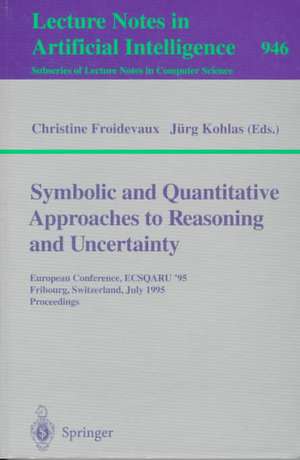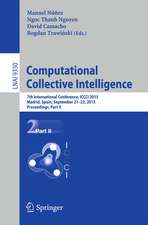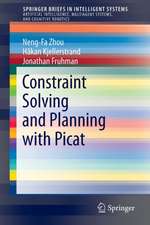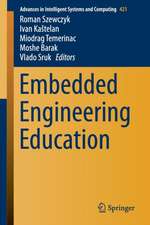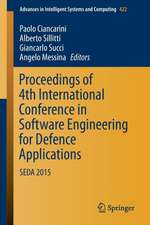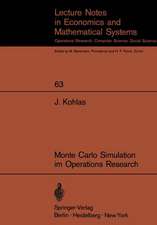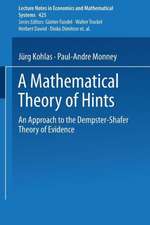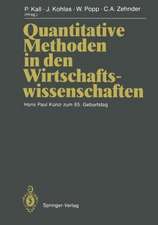Symbolic and Quantitative Approaches to Reasoning and Uncertainty: European Conference, ECSQARU '95, Fribourg, Switzerland, July 3-5, 1995. Proceedings: Lecture Notes in Computer Science, cartea 946
Editat de Christine Froidevaux, Juerg Kohlasen Limba Engleză Paperback – 26 iun 1995
In recent years, it has become apparent that an important part of the theory of AI is concerned with reasoning on the basis of uncertain, vague, incomplete, or inconsistent information. A variety of nonclassical formalisms, both symbolic and numerical, have been developed and are addressed in this volume; among them are nonmonotonic and modal logics, fuzzy sets, possibility theory, believe functions, evidence theory, dynamic models, and Bayesian networks.
Din seria Lecture Notes in Computer Science
- 20%
 Preț: 1061.55 lei
Preț: 1061.55 lei - 20%
 Preț: 307.71 lei
Preț: 307.71 lei - 20%
 Preț: 438.69 lei
Preț: 438.69 lei - 20%
 Preț: 579.30 lei
Preț: 579.30 lei -
 Preț: 410.88 lei
Preț: 410.88 lei - 17%
 Preț: 427.22 lei
Preț: 427.22 lei - 20%
 Preț: 596.46 lei
Preț: 596.46 lei - 15%
 Preț: 448.04 lei
Preț: 448.04 lei - 20%
 Preț: 353.50 lei
Preț: 353.50 lei -
 Preț: 389.49 lei
Preț: 389.49 lei - 20%
 Preț: 309.90 lei
Preț: 309.90 lei - 20%
 Preț: 645.28 lei
Preț: 645.28 lei - 20%
 Preț: 763.23 lei
Preț: 763.23 lei - 15%
 Preț: 580.46 lei
Preț: 580.46 lei - 20%
 Preț: 310.28 lei
Preț: 310.28 lei - 20%
 Preț: 655.02 lei
Preț: 655.02 lei - 20%
 Preț: 1183.14 lei
Preț: 1183.14 lei - 20%
 Preț: 340.32 lei
Preț: 340.32 lei -
 Preț: 449.57 lei
Preț: 449.57 lei - 20%
 Preț: 591.51 lei
Preț: 591.51 lei - 18%
 Preț: 938.83 lei
Preț: 938.83 lei - 20%
 Preț: 337.00 lei
Preț: 337.00 lei - 20%
 Preț: 649.50 lei
Preț: 649.50 lei - 20%
 Preț: 607.40 lei
Preț: 607.40 lei - 20%
 Preț: 1414.79 lei
Preț: 1414.79 lei - 20%
 Preț: 1024.44 lei
Preț: 1024.44 lei - 20%
 Preț: 583.40 lei
Preț: 583.40 lei - 20%
 Preț: 453.32 lei
Preț: 453.32 lei - 20%
 Preț: 575.49 lei
Preț: 575.49 lei - 20%
 Preț: 1075.26 lei
Preț: 1075.26 lei - 20%
 Preț: 585.88 lei
Preț: 585.88 lei - 20%
 Preț: 825.93 lei
Preț: 825.93 lei - 17%
 Preț: 360.20 lei
Preț: 360.20 lei - 20%
 Preț: 763.23 lei
Preț: 763.23 lei - 20%
 Preț: 340.32 lei
Preț: 340.32 lei - 20%
 Preț: 504.58 lei
Preț: 504.58 lei - 20%
 Preț: 369.13 lei
Preț: 369.13 lei - 20%
 Preț: 580.93 lei
Preț: 580.93 lei - 20%
 Preț: 343.62 lei
Preț: 343.62 lei - 20%
 Preț: 350.21 lei
Preț: 350.21 lei - 20%
 Preț: 583.40 lei
Preț: 583.40 lei - 20%
 Preț: 583.40 lei
Preț: 583.40 lei - 15%
 Preț: 438.59 lei
Preț: 438.59 lei - 20%
 Preț: 341.95 lei
Preț: 341.95 lei - 20%
 Preț: 238.01 lei
Preț: 238.01 lei - 20%
 Preț: 538.30 lei
Preț: 538.30 lei
Preț: 339.80 lei
Preț vechi: 424.75 lei
-20% Nou
Puncte Express: 510
Preț estimativ în valută:
65.02€ • 69.53$ • 54.21£
65.02€ • 69.53$ • 54.21£
Carte tipărită la comandă
Livrare economică 17 aprilie-01 mai
Preluare comenzi: 021 569.72.76
Specificații
ISBN-13: 9783540601128
ISBN-10: 3540601120
Pagini: 448
Ilustrații: X, 438 p.
Dimensiuni: 155 x 235 x 24 mm
Greutate: 0.62 kg
Ediția:1995
Editura: Springer Berlin, Heidelberg
Colecția Springer
Seriile Lecture Notes in Computer Science, Lecture Notes in Artificial Intelligence
Locul publicării:Berlin, Heidelberg, Germany
ISBN-10: 3540601120
Pagini: 448
Ilustrații: X, 438 p.
Dimensiuni: 155 x 235 x 24 mm
Greutate: 0.62 kg
Ediția:1995
Editura: Springer Berlin, Heidelberg
Colecția Springer
Seriile Lecture Notes in Computer Science, Lecture Notes in Artificial Intelligence
Locul publicării:Berlin, Heidelberg, Germany
Public țintă
ResearchCuprins
For all typical.- A posteriori knowledge: from ambiguous knowledge and undefined information to knowledge.- Modeling uncertain relational knowledge: the AV-quantified production rules approach.- Multiple database logic.- A local approach to reasoning under inconsistency in stratified knowledge bases.- Quasi-classical logic: Non-trivializable classical reasoning from inconsistent information.- A cost bounded possibilistic ATMS.- A substructural connective for possibilistic logic.- Chain graphs: Semantics and expressiveness.- Axiomatic treatment of possibilistic independence.- Parametric structure of probabilities in Bayesian networks.- From non-monotonic syntax-based entailment to preference-based argumentation.- Non-monotonic syntax-based entailment: A classification of consequence relations.- Local Möbius transforms of monotone capacities.- Automated reasoning with merged contradictory information whose reliability depends on topics.- Linking transition-based update and base revision.- Prioritized transitions for updates.- Probabilistic satisfiability and decomposition.- Update postulates without inertia.- Similarity-based consequence relations.- Epistemic approach to actions with typical effects.- Nonmonotonic belief state frames and reasoning frames.- A Bayesian network based learning system: — Architecture and performance comparison with other methods.- Specificity by default.- Constructing flexible dynamic belief networks from first-order probabilistic knowledge bases.- On the formalism of stochastic logic.- Using default logic in information retrieval.- Sensitivity analysis in Bayesian networks.- Bayesian approximation and invariance of Bayesian belief functions.- Model-based diagnostics using hints.- An axiomatic approach to extensional probability measures.-The dynamics of default reasoning.- Lemma handling in default logic theorem provers.- Uncertain reasoning in concept lattices.- A theorem prover for default logic based on prioritized conflict resolution and an extended resolution principle.- A theorem prover for lukaszewicz open default theory.- Two different types of discontinuity of bayesian learning in causal probabilistic networks.- Revision in extended propositional calculus.- Using qualitative uncertainty in protein topology prediction.- Circumscribing features and fluents: Reasoning about action with default effects.- Using Maximum Entropy to compute marginal probabilities in a causal binary tree need not take exponential time.- Yet some more considerations on cumulativity in default logics.- A two-stage approach to first order default reasoning.- A reduction of the theory of confirmation to the notions of distance and measure.- Cluster-based specification techniques in Dempster-Shafer theory.- And/or trees for knowledge representation.- Why defeasible deontic logic needs a multi preference semantics.- Numeric defaults.
